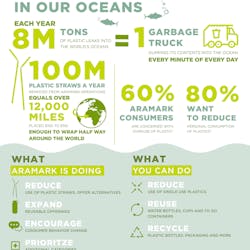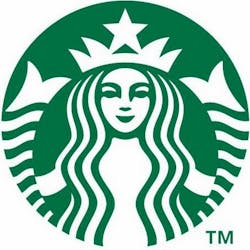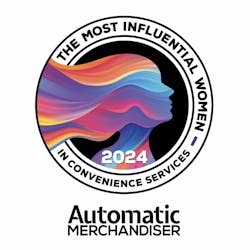Sipping is in the crosshairs of the environmental movement. This summer, plastic straws are being banned (or reduced) by cities, food retailers and foodservice businesses alike.
According to the Association Press, an ordinance in Seattle, WA, makes offering plastic straws a finable offense in the city limits. San Franciso, CA, has proposed a similar ordinance as well, says the San Francisco Chronicle.
As for businesses, Starbucks has made a commitment to eliminate single-use plastic straws globally by 2020. McDonalds did not announce a U.S. ban per say, but did promise to trial plastic straw alternatives in certain U.S. markets (something it is already doing in the U.K. and Ireland).
Most notably for the industry perhaps is national operator Aramark who committed to significantly reducing single-use disposable plastics across its global food service operations by 2022. Single-use plastics include straws as well as other items such as stirrers and cutlery. Interestingly, Aramark cited a survey of its consumers in support of this change. According to the release, 60 percent of its respondents are concerned with the overuse of plastic and nearly 80 percent are trying to reduce personal consumption.
Where that leaves us
There are some that believe the plastic straw bans are more or less a fad. Afterall, they represent a significantly small percentage of the plastic humans throw away each year, which is estimated to be 88 pounds per human, according to Business Insider. What impact could a small straw have?
Admittedly, it could be none. There have been other environmental efforts that surfaced, but didn’t have a significant impact, such as the establishment of Earth Day or even the Environmental Protection Agency (both of which were started in the 70s, I believe). While I remember planting a tree on Earth Day growing up or being told to turn off the water while I brush my teeth, I would agree that those messages didn’t significantly change the way humans live or what they toss in the trash.
This time things might be different
If you consider the healthy eating movement, especially in vending, I think you see some correlations. There were food fads, such as fat free items, snack packs, Atkins, etc. However, the healthy movement finally coalesced into a true change in what companies want in the break room and what consumers purchase (to some degree). I think it was the Millennials. They wanted certain products, did research online about those products and were raised with messages about healthy eating.
They were also raised with messages about the environment. That might be the difference in turning a simple plastic straw ban into an overall shift in how consumers think about plastic. Time will tell. Regardless, operators looking forward ought to be prepared. More bans are likely as the environmental ban(d) wagon rolls through the country. Companies will likely be asking operators for plastic straw alternatives, as well as other eco products. In fact, we may already be seeing the shift.
Carl Moser, sales manager of Cardinal Canteen in Virgina has seen an increase in the last few years in the number of requests for Styrofoam cup alternatives due concerns about the environment. He told VendingMarketWatch.com that customers looking for these options consider it the right thing to do, regardless of cost.
Customers looking to reduce their environmental impact was partly behind Chattanooga, TN- Five Star Food Service decision to offer customers a broad range of Emerald Brand sustainable products. It will also utilize Emerald Brand’s communication and consultative programs “...to dramatically broaden and grow their CSR initiatives beyond the disposable and cleaning categories. This includes providing clients with quarterly environmental impact statements, communicating health and wellness initiatives, and educating their clients on the importance of sustainability in regards to their everyday consumption.”
In the upcoming State of Office Coffee Service Report, 83.3 percent of operators are offering some sort of sustainable product to customers, an increase of 1.5 percent from the year before. This was before the plastic straw bans made headlines. I would wager that it will be higher next year.
While not every location will want to spend extra money on eco-products, there will be some and operators should have options and alternatives ready.







